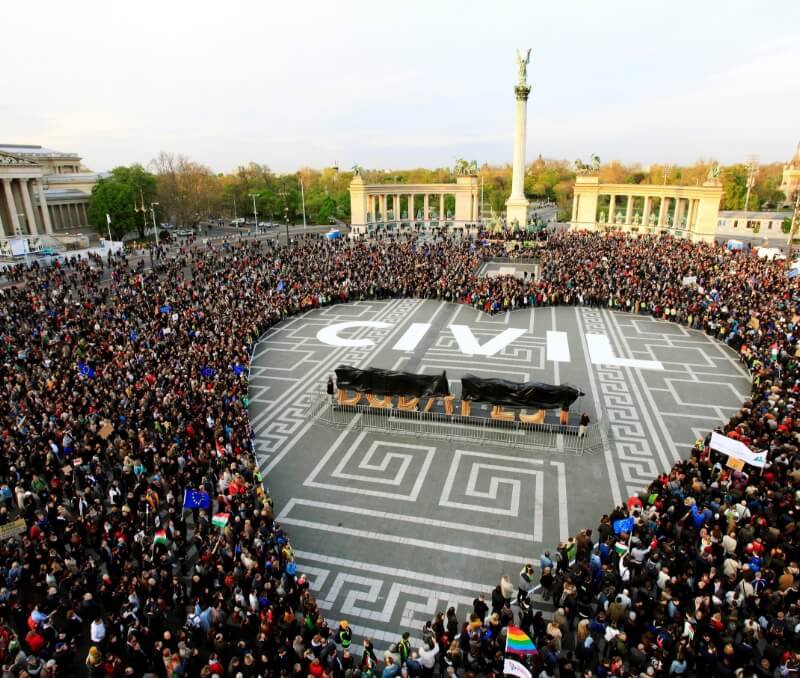Civitates
Following the USAID funding freeze, several Civitates foundation partners have joined forces to mobilise emergency funding for embattled media outlets in Central and Eastern Europe. As a result, €1 million was raised, which will enable Civitates to support five new outlets (in Cyprus, Czech Republic, Romania, Lithuania and Slovenia) with 3-year core grants, and will start a new partnership with OCCRP (the Organised Crime and Corruption Reporting Project) to provide tailored support to these outlets to enhance their organisational resilience and sustainability.
Civitates' annual report is available here.
In parallel to this emergency funding, we are finalising the selection of our new cohort of media partners across Europe, as well as the selection of our new cohort of tech and democracy grantees. We also just launched an open call for projects in Italy, one of our new priority countries in our Civic Power portfolio.
EPIM
EPIM hosted on the 27th and 28th of May the CEE Network for Migration and Inclusion Convening, a dynamic two-day event in Bucharest that brought together actors from across Central and Eastern Europe to strengthen collaboration on migration and inclusion. Throughout the convening, participants explored the role of civil society in fostering inclusive and welcoming communities, the potential of the private sector to unlock opportunities for employment and entrepreneurship for migrants, and the connection between migration work and the reinforcement of democratic institutions and civic trust.
Epim annual report is available here
The event was marked by rich dialogue, cross-sector exchange, and a shared commitment to building ecosystems of belonging. Participants left with renewed clarity, stronger networks, and a collective sense of purpose. EPIM extends its sincere thanks to all who contributed their insights, experience, and imagination. The momentum continues—grounded in trust, collaboration, and a shared vision for a more inclusive Europe.
European AI & Society Fund
The European AI & Society Fund recently awarded €2 million to 15 bold, adventurous projects that explore how to hold accountable those misusing AI and causing harm in Europe. Defending workers’ rights, holding data centre operators accountable for environmental and social damage, and tackling AI-enabled profiling affecting black and migrant communities, are just some of the projects that organisations will be implementing over the next year with funding from the AI Accountability grants. In February, the Fund also awarded €400,000 across 10 grants to organisations which will be focusing on the AI Act's implementation by 2026.
Both of these are part of European AI & Society Fund's €4 million "Making Regulation Work" programme, supporting public interest advocates to challenge the harmful impacts of AI on society and secure accountability for AI use by supporting the effective implementation and enforcement of legislation in Europe.
European Fund for the Balkans
The European Fund for the Balkans (EFB) organized the third edition of the Engaged Democracy Convention (EDI2025), which was held from 21 to 23 May 2025, in Skopje, North Macedonia.
Under its powerful theme “Engage, Inspire, Empower!”, the convention gathered over 100 engaged citizens, journalists, changemakers, movements, initiatives and civil society representatives from across the Western Balkans.
Together the participants tackled key regional issues—environment, public spaces, media, decent work, and civic rights, and spotlighted emerging topics including mental health, digital security, and the rise of anti-gender movements.
Once more, EDI2025 emphasized the necessity to align local needs with regional action, strengthening cross-movement alliances, and leveraging crises as catalysts for collective change.
Jafowa
JAFOWA participated in the "Salone del Gusto - Terra Madre 2024" in Turin at the end of September, where it organised a workshop on "Partnerships for agro-ecological intensification and sustainable food systems in Africa".
The testimonies and contributions of a range of local and international actors converged on the role of farmers' organisations in promoting agro-ecological intensification. Farmers' organisations are well placed to contribute to sustainable food systems in their territories, to engage in multi-stakeholder partnerships, and to engage with youth and women to plan for their development.
The team also conducted backstopping missions to Senegal and Burkina last October/December. JAFOWA is currently preparing its 4th Call for Proposals, which will be launched in March/April 2025.
The Alliance for Socially Engaged Arts
The Alliance for Socially Engaged Arts launched its inaugural Fellowship earlier this year, a programme designed to connect and support visionary leaders of arts organisations driven by community engagement and social change across Europe.
In June, the Alliance announced the first cohort of 15 fellows who have been awarded a place on the Fellowship programme. The selected fellows represent a wide range of artistic disciplines, geographies and social issues.

Their organisations address urgent challenges like the climate crisis, homelessness and peacebuilding through participatory and co-creative arts approaches deeply anchored in their local communities. Over the next 18 months, the Fellows will embark on a collaborative learning journey rooted in action learning and peer exchange. The programme will provide leaders with tailored resources, capacity-building and cross-border connections to strengthen their organisational models and collectively drive advocacy efforts to scale the impact and recognition of this field across Europe.
Alliance for Gender Equality in Europe
In April, the Alliance for Gender Equality published its annual Impact Report, proudly highlighting our achievements, lessons learned and – most importantly - the work of their grantee partners.
The 2024 report showcases how, over the past year, we supported many grassroots organisations doing essential work on women’s economic inclusion, LGBTQ+ rights, reproductive rights, protecting migrants, helping women stay safe, and many other issues. Their stories – some of which are featured in this report – serve as a reminder that positive change is always possible, even when the odds seem insurmountable.
The Alliance for Gender Equality in Europe launched its new website in April.
To meet the needs of a growing pooled fund, we welcomed a new Programs Assistant in May, who will help us implement our grant-making, capacity strengthening, and communication activities. We are also recruiting for new members of our advisory committee, which provides vital guidance to both our steering committee members and the program team.
Looking ahead, our next Steering Committee meeting will take place in Paris on 16 and 17 June where member foundations will validate grant renewals for our Economic Opportunities sub-fund, discuss insights from the sector mapping, and begin shaping our funding strategy on movement building.
Articles in the same category

Highlights
Highlights from the NEF Collaborative Day - May 16, 2025, Brussels The main objectives of this...

Edito
Dear Readers, Reflecting on the 2022–2024 period for our NEF triennial report has offered us the...

Upcoming Events
NEF Board
15 April 2026
Paris
